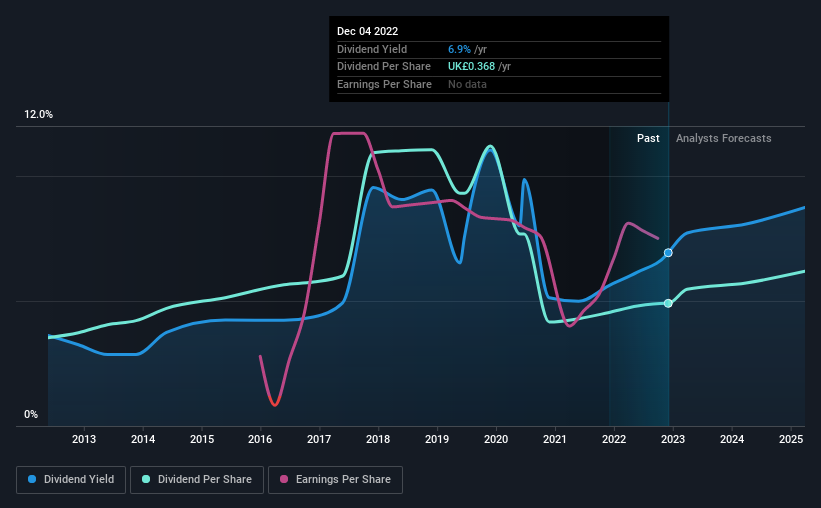- United Kingdom
- /
- Diversified Financial
- /
- LSE:PAY
PayPoint (LON:PAY) Will Pay A Larger Dividend Than Last Year At £0.092
PayPoint plc (LON:PAY) will increase its dividend from last year's comparable payment on the 6th of March to £0.092. This makes the dividend yield 6.9%, which is above the industry average.
Check out the opportunities and risks within the GB IT industry.
PayPoint's Dividend Is Well Covered By Earnings
A big dividend yield for a few years doesn't mean much if it can't be sustained. PayPoint was earning enough to cover the previous dividend, but it was paying out quite a large proportion of its free cash flows. The business is earning enough to make the dividend feasible, but the cash payout ratio of 89% indicates it is more focused on returning cash to shareholders than growing the business.
The next year is set to see EPS grow by 26.0%. Assuming the dividend continues along recent trends, we think the payout ratio could be 52% by next year, which is in a pretty sustainable range.

Dividend Volatility
While the company has been paying a dividend for a long time, it has cut the dividend at least once in the last 10 years. The dividend has gone from an annual total of £0.265 in 2012 to the most recent total annual payment of £0.368. This means that it has been growing its distributions at 3.3% per annum over that time. We're glad to see the dividend has risen, but with a limited rate of growth and fluctuations in the payments the total shareholder return may be limited.
Dividend Growth Is Doubtful
With a relatively unstable dividend, it's even more important to evaluate if earnings per share is growing, which could point to a growing dividend in the future. In the last five years, PayPoint's earnings per share has shrunk at approximately 9.6% per annum. Declining earnings will inevitably lead to the company paying a lower dividend in line with lower profits. However, the next year is actually looking up, with earnings set to rise. We would just wait until it becomes a pattern before getting too excited.
In Summary
In summary, while it's always good to see the dividend being raised, we don't think PayPoint's payments are rock solid. The company hasn't been paying a very consistent dividend over time, despite only paying out a small portion of earnings. We don't think PayPoint is a great stock to add to your portfolio if income is your focus.
It's important to note that companies having a consistent dividend policy will generate greater investor confidence than those having an erratic one. However, there are other things to consider for investors when analysing stock performance. For instance, we've picked out 2 warning signs for PayPoint that investors should take into consideration. If you are a dividend investor, you might also want to look at our curated list of high yield dividend stocks.
New: Manage All Your Stock Portfolios in One Place
We've created the ultimate portfolio companion for stock investors, and it's free.
• Connect an unlimited number of Portfolios and see your total in one currency
• Be alerted to new Warning Signs or Risks via email or mobile
• Track the Fair Value of your stocks
Have feedback on this article? Concerned about the content? Get in touch with us directly. Alternatively, email editorial-team (at) simplywallst.com.
This article by Simply Wall St is general in nature. We provide commentary based on historical data and analyst forecasts only using an unbiased methodology and our articles are not intended to be financial advice. It does not constitute a recommendation to buy or sell any stock, and does not take account of your objectives, or your financial situation. We aim to bring you long-term focused analysis driven by fundamental data. Note that our analysis may not factor in the latest price-sensitive company announcements or qualitative material. Simply Wall St has no position in any stocks mentioned.
About LSE:PAY
PayPoint
Engages in the provision of payments and banking, shopping, and e-commerce services and products in the United Kingdom.
Reasonable growth potential with adequate balance sheet.
Market Insights
Community Narratives





